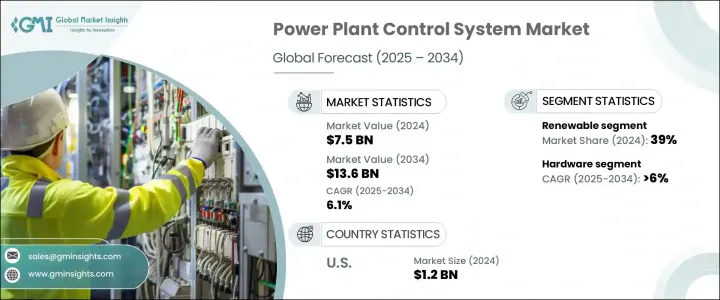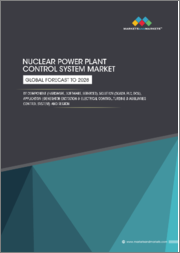
|
시장보고서
상품코드
1740832
발전소 제어 시스템 시장 기회, 성장 촉진요인, 산업 동향 분석 및 예측(2025-2034년)Power Plant Control System Market Opportunity, Growth Drivers, Industry Trend Analysis, and Forecast 2025 - 2034 |
||||||
세계의 발전소 제어 시스템 시장은 2024년에 75억 달러로 평가되었으며, 2034년에는 CAGR 6.1%를 나타내 136억 달러에 이를 것으로 추정됩니다.
세계가 에너지 인프라를 근대화하고 보다 깨끗한 전력으로 이행한다는 압력 증가에 직면하면서, 제어 시스템은 발전소의 운전 방법을 재정의하는데 중심적인 역할을 하고 있습니다. 실시간 성능 모니터링, 원활한 그리드 통합, 안정성 향상을 실현하는 스마트 제어 기술에 대한 투자를 강화하고 있습니다. 인프라의 노후화, 에너지 수요 증가, 탄소 중립의 세계의 추진에 의해 제어 플랫폼의 업그레이드나 치환이 꾸준히 진행되고 있습니다. AI을 활용한 솔루션을 활용하여 운영의 합리화, 다운타임 최소화, 운영 효율성 향상을 도모하고 있습니다.

사이버 보안에 대한 우려가 높아짐에 따라 발전소 제어 시스템은 현재 임베디드 보안 프로토콜, 탄력있는 통신 네트워크, 고급 자동화 프레임 워크로 설계되었습니다. 관리하는 방법을 재구축해, 운전을 보다 신속하고, 안전하며, 신뢰성이 높은 것으로 하고 있습니다. 차세대 자동화에 리소스를 쏟는 동안 프로그래머블 로직 컨트롤러(PLC), 분산 제어 시스템(DCS), SCADA 플랫폼은 에너지 효율, 부하 최적화, 수동 개입 감소 향상을 추진하고 현대 에너지 에코시스템 쿠본이 되고 있습니다. 재생 가능 에너지의 통합과 탄소 중립적인 운용을 추진하는 규제의 의무화에 의해 유틸리티 기업은 모듈식으로 확장성이 높고, 적응성이 높은 솔루션을 요구해, 노후화된 제어 시스템의 오버홀을 진행하고 있습니다.
| 시장 범위 | |
|---|---|
| 시작 연도 | 2024년 |
| 예측 연도 | 2025-2034년 |
| 시작 금액 | 75억 달러 |
| 예측 금액 | 136억 달러 |
| CAGR | 6.1% |
하드웨어 분야는 2034년까지 연평균 복합 성장률(CAGR) 6%를 나타내 강력한 성장을 유지할 전망입니다. 화력 발전소와 원자력 발전소의 지속적인 업그레이드는 새로운 플랜트 시운전과 함께 진화하는 규제 기준을 충족하는 정밀 제어 하드웨어에 대한 수요를 부추기고 있습니다. 천연가스 발전소는 또한 터빈을 관리하고, 부하 응답을 최적화하고, 특히 복합 사이클 발전소의 도입이 가속화되기 때문에 배출을 억제하기 위해 통합 제어 시스템에 크게 의존합니다.
천연 가스 발전소 제어 시스템 분야는 가스 터빈과 증기 터빈을 조합하여 효율을 극대화하고 이산화탄소 배출량을 삭감하는 복합 사이클 발전소의 인기가 높아지면서 2034년까지 연평균 복합 성장률(CAGR) 6%를 나타낼 전망입니다. 이러한 고도의 시설에서는 연소조정에서 열회수, 배출제어에 이르기까지 복잡한 운전을 관리할 수 있는 고성능 제어 솔루션이 요구되어 동적 부하 조건 하에서 피크 성능을 확보할 수 있습니다. 전환 연료로서 천연가스에 대한 선호도가 높아짐에 따라 주요 시장의 인프라 투자가 더욱 강화되고 있습니다.
미국의 발전소 제어 시스템 시장은 노후화된 에너지 그리드를 현대화하기 위한 적극적인 노력에 힘입어 2024년에는 12억 달러에 달했습니다. 분산형 에너지 자원, 재생 가능 에너지 발전의 급증, 보다 스마트한 송전망에 대한 수요가 연방·주 레벨에서 고도의 자동화·실시간 제어 기술에 대한 대액의 투자를 촉진하고 있습니다.
세계 발전소 제어 시스템 시장에서 활동하는 주요 기업으로는 ABB, 지멘스 에너지, 슈나이더 일렉트릭, 미쓰비시 중공업, 에머슨 일렉트릭, 로크웰 오토메이션, 요코가와 전기, 히타치 에너지, GE Vernova, WAGO 등이 있습니다. 각 회사는 지속적인 기술 혁신, AI를 활용한 자동화, 유틸리티 기업과의 전략적 파트너십에 주력하여 시장에서의 존재감을 높이고 있습니다. 강화된 HMI 인터페이스, 강력한 사이버 보안 기능, 원격 진단, 라이프사이클 전반에 걸친 서비스는 벤더가 경쟁력을 유지하고 진화하는 시장 수요에 부응하는 데 필수적입니다.
목차
제1장 조사 방법과 범위
제2장 주요 요약
제3장 업계 인사이트
- 생태계 분석
- 트럼프 정권의 관세 분석
- 무역에 미치는 영향
- 무역량의 혼란
- 보복 조치
- 업계에 미치는 영향
- 공급측의 영향(원재료)
- 주요 원재료의 가격 변동
- 공급망 재구성
- 생산 비용에 미치는 영향
- 수요측의 영향(판매가격)
- 최종 시장에의 가격 전달
- 시장 점유율 동향
- 소비자의 반응 패턴
- 공급측의 영향(원재료)
- 영향을 받는 주요 기업
- 전략적인 업계 대응
- 공급망 재구성
- 가격 설정 및 제품 전략
- 정책관여
- 전망과 향후 검토 사항
- 무역에 미치는 영향
- 규제 상황
- 업계에 미치는 영향요인
- 성장 촉진요인
- 업계의 잠재적 위험 및 과제
- 성장 가능성 분석
- Porter's Five Forces 분석
- PESTEL 분석
제4장 경쟁 구도
- 서론
- 전략적 전망
- 혁신 및 지속가능성 전망
제5장 시장 규모와 예측 : 구성 요소별(2021-2034년)
- 주요 동향
- 하드웨어
- 소프트웨어
- 서비스
제6장 시장 규모와 예측 : 솔루션별(2021-2034년)
- 주요 동향
- 모니터링 제어 및 데이터 수집(SCADA)
- 분산제어시스템(DCS)
- 프로그래머블 로직 컨트롤러(PLC)
- 플랜트 자산 관리(PAM)
- 플랜트 라이프사이클 관리(PLM)
제7장 시장 규모와 예측 : 플랜트 유형별(2021-2034년)
- 주요 동향
- 석탄
- 천연가스
- 핵
- 수력 발전
- 재생 가능
제8장 시장 규모와 예측 : 지역별(2021-2034년)
- 주요 동향
- 북미
- 미국
- 캐나다
- 멕시코
- 유럽
- 독일
- 영국
- 프랑스
- 이탈리아
- 러시아
- 아시아태평양
- 중국
- 일본
- 인도
- 한국
- 중동 및 아프리카
- 사우디아라비아
- 아랍에미리트(UAE)
- 남아프리카
- 라틴아메리카
- 브라질
- 아르헨티나
제9장 기업 프로파일
- ABB
- Bachmann electronic
- Emerson Electric
- GE Vernova
- Hitachi Energy
- Ingeteam
- Meteocontrol
- Mitsubishi Heavy Industries
- Motorola Solutions
- Nexus Integra
- OMRON Corporation
- Petrotech
- Rockwell Automation
- Schneider Electric
- Siemens Energy
- Toshiba Energy Systems & Solutions Corporation
- Valmet
- WAGO
- Yokogawa
The Global Power Plant Control System Market was valued at USD 7.5 billion in 2024 and is estimated to grow at a CAGR of 6.1% to reach USD 13.6 billion by 2034, fueled by the energy sector's rapid move toward smarter, more efficient power generation. As the world faces mounting pressure to modernize energy infrastructure and transition toward cleaner power, control systems are playing a central role in redefining how plants operate. Power grids are becoming more dynamic, and utilities are stepping up investments in smart control technologies that deliver real-time performance monitoring, seamless grid integration, and enhanced reliability. With the growing adoption of renewable energy sources and decentralized generation, the need for flexible, intelligent automation solutions is stronger than ever. Aging infrastructure, rising energy demands, and the global push for carbon neutrality are driving a steady wave of upgrades and replacements in control platforms. Industry players are leveraging digital twins, predictive analytics, and AI-powered solutions to streamline operations, minimize downtime, and boost operational efficiency. Government policies supporting grid modernization, energy security, and emission reduction targets are further intensifying the momentum for control system innovation across the global landscape.

With cybersecurity concerns rising, power plant control systems are now being designed with built-in security protocols, resilient communication networks, and advanced automation frameworks. Technologies such as artificial intelligence, machine learning, and real-time diagnostics are reshaping how plants monitor and manage processes, making operations faster, safer, and more reliable. Predictive maintenance tools and advanced fault detection mechanisms are helping utilities reduce unplanned outages and improve overall plant performance. As global manufacturers and government bodies pour resources into next-generation automation, programmable logic controllers (PLC), distributed control systems (DCS), and SCADA platforms are becoming the backbone of modern energy ecosystems, driving gains in energy efficiency, load optimization, and reduced manual interventions. Regulatory mandates promoting renewable energy integration and carbon-neutral operations are prompting utilities to overhaul aging control systems in favor of modular, scalable, and highly adaptable solutions.
| Market Scope | |
|---|---|
| Start Year | 2024 |
| Forecast Year | 2025-2034 |
| Start Value | $7.5 Billion |
| Forecast Value | $13.6 Billion |
| CAGR | 6.1% |
The hardware segment is expected to maintain robust growth with a projected CAGR of 6% through 2034. Ongoing upgrades in thermal and nuclear power facilities, along with the commissioning of new plants, are fueling the demand for precision control hardware that meets evolving regulatory standards. Natural gas power plants are also leaning heavily on integrated control systems to manage turbines, optimize load response, and curb emissions, especially with the accelerating deployment of combined cycle plants.
The natural gas power plant control system segment is poised to grow at a CAGR of 6% through 2034, supported by the rising popularity of combined cycle plants that pair gas and steam turbines to maximize efficiency and lower carbon emissions. These sophisticated facilities demand high-performance control solutions capable of managing complex operations from combustion tuning to heat recovery and emissions control, ensuring peak performance under dynamic load conditions. The growing preference for natural gas as a transitional fuel is further boosting infrastructure investments across key markets.
The United States Power Plant Control System Market reached USD 1.2 billion in 2024, backed by aggressive initiatives to modernize the country's aging energy grid. A surge in distributed energy resources, renewable generation, and demand for smarter grids is driving heavy investment in advanced automation and real-time control technologies at both federal and state levels.
Key players active in the Global Power Plant Control System Market include ABB, Siemens Energy, Schneider Electric, Mitsubishi Heavy Industries, Emerson Electric, Rockwell Automation, Yokogawa, Hitachi Energy, GE Vernova, WAGO, and others. Companies are focusing on continuous innovation, AI-driven automation, and strategic partnerships with utilities to expand their market presence. Modular designs, enhanced HMI interfaces, strong cybersecurity features, remote diagnostics, and full lifecycle services are becoming critical for vendors to stay competitive and meet evolving market demands.
Table of Contents
Chapter 1 Methodology & Scope
- 1.1 Research design
- 1.2 Market estimates & forecast parameters
- 1.3 Forecast calculation
- 1.4 Data sources
- 1.4.1 Primary
- 1.4.2 Secondary
- 1.4.2.1 Paid
- 1.4.2.2 Public
- 1.5 Market definitions
Chapter 2 Executive Summary
- 2.1 Industry synopsis, 2021 - 2034
Chapter 3 Industry Insights
- 3.1 Industry ecosystem analysis
- 3.2 Trump administration tariffs analysis
- 3.2.1 Impact on trade
- 3.2.1.1 Trade volume disruptions
- 3.2.1.2 Retaliatory measures
- 3.2.2 Impact on the industry
- 3.2.2.1 Supply-side impact (raw materials)
- 3.2.2.1.1 Price volatility in key materials
- 3.2.2.1.2 Supply chain restructuring
- 3.2.2.1.3 Production cost implications
- 3.2.2.2 Demand-side impact (selling price)
- 3.2.2.2.1 Price transmission to end markets
- 3.2.2.2.2 Market share dynamics
- 3.2.2.2.3 Consumer response patterns
- 3.2.2.1 Supply-side impact (raw materials)
- 3.2.3 Key companies impacted
- 3.2.4 Strategic industry responses
- 3.2.4.1 Supply chain reconfiguration
- 3.2.4.2 Pricing and product strategies
- 3.2.4.3 Policy engagement
- 3.2.5 Outlook and future considerations
- 3.2.1 Impact on trade
- 3.3 Regulatory landscape
- 3.4 Industry impact forces
- 3.4.1 Growth drivers
- 3.4.2 Industry pitfalls & challenges
- 3.5 Growth potential analysis
- 3.6 Porter's analysis
- 3.6.1 Bargaining power of suppliers
- 3.6.2 Bargaining power of buyers
- 3.6.3 Threat of new entrants
- 3.6.4 Threat of substitutes
- 3.7 PESTEL analysis
Chapter 4 Competitive Landscape, 2025
- 4.1 Introduction
- 4.2 Strategic outlook
- 4.3 Innovation & sustainability landscape
Chapter 5 Market Size and Forecast, By Component, 2021 - 2034 (USD Million)
- 5.1 Key trends
- 5.2 Hardware
- 5.3 Software
- 5.4 Services
Chapter 6 Market Size and Forecast, By Solution, 2021 - 2034 (USD Million)
- 6.1 Key trends
- 6.2 Supervisory Control & Data Acquisition (SCADA)
- 6.3 Distributed Control System (DCS)
- 6.4 Programmable Logic Controller (PLC)
- 6.5 Plant Asset Management (PAM)
- 6.6 Plant Lifecycle Management (PLM)
Chapter 7 Market Size and Forecast, By Plant Type, 2021 - 2034 (USD Million)
- 7.1 Key trends
- 7.2 Coal
- 7.3 Natural gas
- 7.4 Nuclear
- 7.5 Hydroelectric
- 7.6 Renewable
Chapter 8 Market Size and Forecast, By Region, 2021 - 2034 (USD Million)
- 8.1 Key trends
- 8.2 North America
- 8.2.1 U.S.
- 8.2.2 Canada
- 8.2.3 Mexico
- 8.3 Europe
- 8.3.1 Germany
- 8.3.2 UK
- 8.3.3 France
- 8.3.4 Italy
- 8.3.5 Russia
- 8.4 Asia Pacific
- 8.4.1 China
- 8.4.2 Japan
- 8.4.3 India
- 8.4.4 South Korea
- 8.5 Middle East & Africa
- 8.5.1 Saudi Arabia
- 8.5.2 UAE
- 8.5.3 South Africa
- 8.6 Latin America
- 8.6.1 Brazil
- 8.6.2 Argentina
Chapter 9 Company Profiles
- 9.1 ABB
- 9.2 Bachmann electronic
- 9.3 Emerson Electric
- 9.4 GE Vernova
- 9.5 Hitachi Energy
- 9.6 Ingeteam
- 9.7 Meteocontrol
- 9.8 Mitsubishi Heavy Industries
- 9.9 Motorola Solutions
- 9.10 Nexus Integra
- 9.11 OMRON Corporation
- 9.12 Petrotech
- 9.13 Rockwell Automation
- 9.14 Schneider Electric
- 9.15 Siemens Energy
- 9.16 Toshiba Energy Systems & Solutions Corporation
- 9.17 Valmet
- 9.18 WAGO
- 9.19 Yokogawa

















